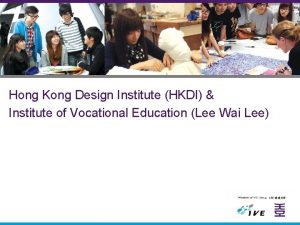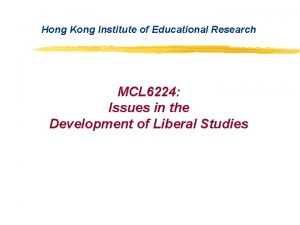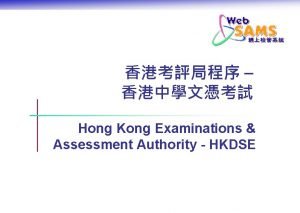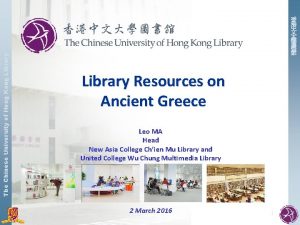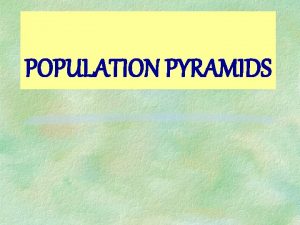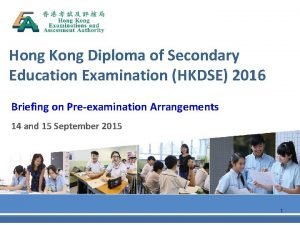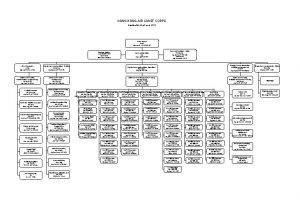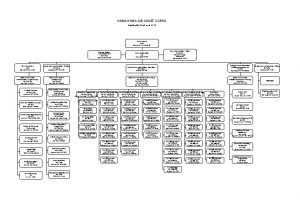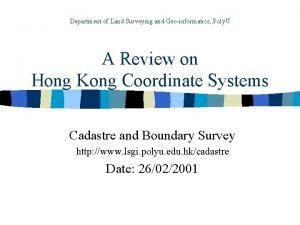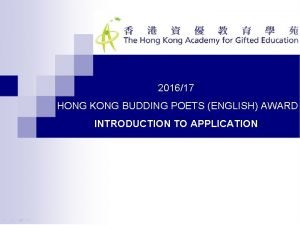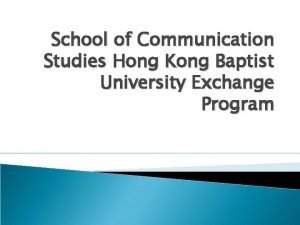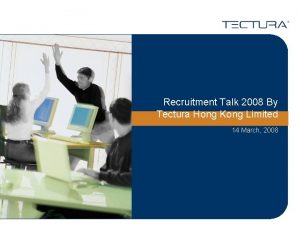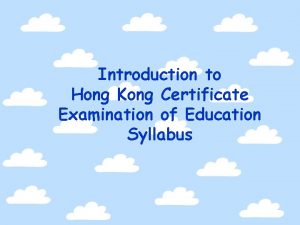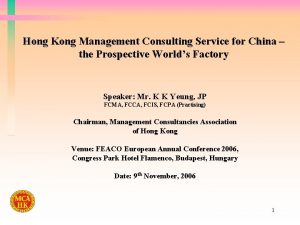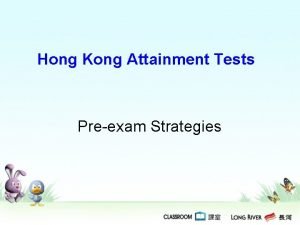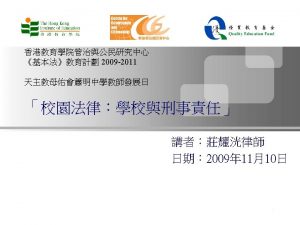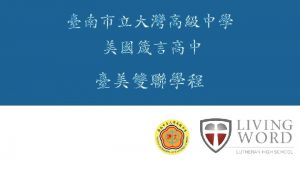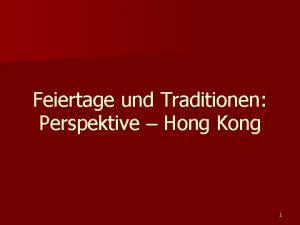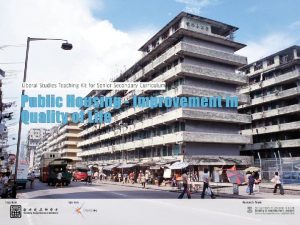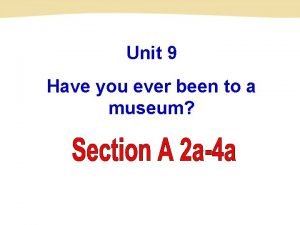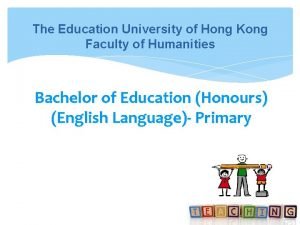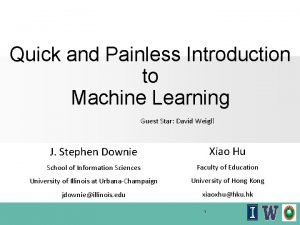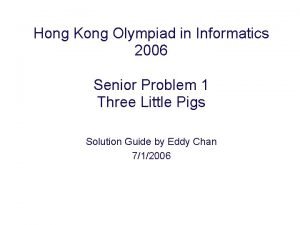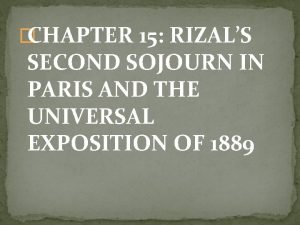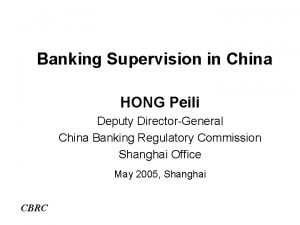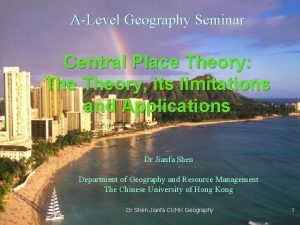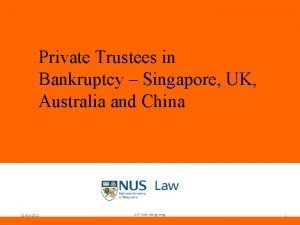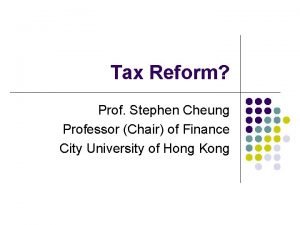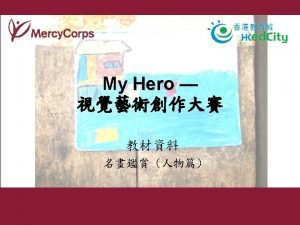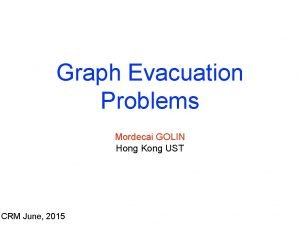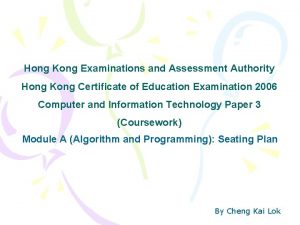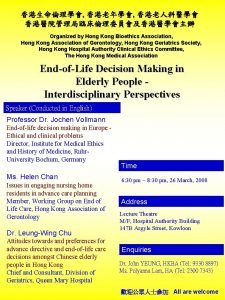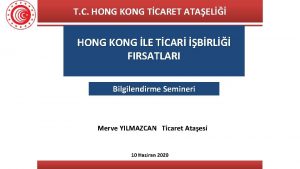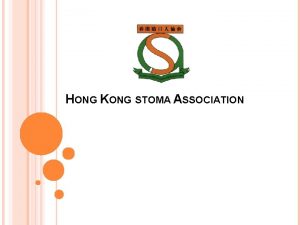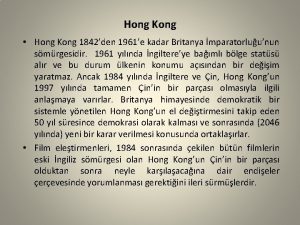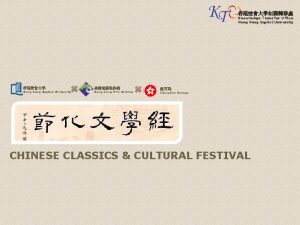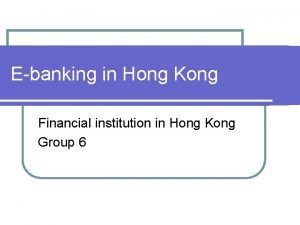Learning Oriented Assessment The Hong Kong Institute of



































































- Slides: 67

學習導向的評估 Learning Oriented Assessment 香港教育學院 The Hong Kong Institute of Education Centre for Assessment Research & Development, Assessment Project 莫慕貞 Magdalena M. C. Mok HKIEd, January 2006 M. Mok Laesrning Oriented Assessment 24 Sep 05

Purpose of Sharing Today 今天的目的 1. What is Learning Oriented Assessment? 學習導向的評估 2. How to implement it through the Assessment Project? 如何在[評估計畫]實踐學習導向的評估 3. Questions & Answers 2

評估的目的 Purposes of Assessment 3

評估的目的 Purposes of Assessment 問責 Accountability 學習 Learning 學生和學習 Learner & Learning 資歷互認 Articulation 選拔 Selection 4

學習導向的評估是甚麼? What is meant by Learning Oriented Assessment (LOA)? 5


Learning Oriented Assessment 1. Assessment For Learning l l l Assessment that enables the teacher to give feedback about a student’s learning & gives feedback which informs teacher’s teaching enables students to obtain feedback for self-monitoring and self-regulation 2. Assessment As Learning Assessment as part of learning of a self-directed learner 學習導向評估 1. 為促進學習的評估 l l l 為老師提供給予學生回饋機 會、及提供有關學生學習進 度 為老師提供回饋,以增強老 師教學效益的評估 為學生提供回饋資料,從而 監察學習進度,並提升其日 後學習素質的評估 2. 作為學習的評估 評估乃自我主動學習不可分 割的一部份。 7

學習導向的評估: 提供回饋,增強元認知 Learning Oriented Assessment Provide feedback; Enhance Metacognition 8

Feedback & Metacognition l Feedback is the most crucial factor for learning (Source: Inside 回饋與元認知 l Black & Wiliam, 暗箱內探, the Black Box by Black and Wiliam, 1997) l Metacognition is one of the four most important factors affecting learning (Source: American Psychological Association, 1997) 回饋乃影響學習的最 重要因素 (資料來源: 1997) l 認知與元認知因素為 影響學習的四個主要 因素之首 (資料來源: American Psychological Association, 1997) 9

Key Factors Contributing to Learning 影響學習的主要 因素 l Cognitive and Metacognitive Factors l 認知與元認知因素 l Motivational and Affective Factors l 動機和情感因素 l 發展和社會因素 l 個體差異因素 l l Developmental and Social Individual Differences Source: American Psychological Association (1997) 10

Feedback that Facilitate Learning l Indicates what the learner is able to do l Shows expectation of what the learner can do at that level l Indicates progress l Includes all domains of development l Identifies areas for improvement l Presented in simple and comprehensible language l Timely 對學習有裨益的回饋 l l l l 指出學生的能力 顯示出在該程度,期望 學生能夠達到的水平、 能力、或能做到的事 顯示進度 包括所有的範疇 指出應改進的地方 以簡單文字表達 適時 Source: Adapted from Rowe, K. (2005) 11

元認知 Metacognition 學習事務 Task 學習事務評估 Task. Assessment 學習者 Self 學習事務管理 Task. Management 自我評估 Self-Assessment 學習策略 Strategy 學習策略評估 Strategy. Assessment 學習策略管理 Strategy. Management 自我管理 Self-Management 14

Let’s Try! 學習事務 Task 學習者 Self 學習策略 Strategy 評估 Assessment 管理 Management Select the most effective strategies 15

自主學習包含那些元素? What are the elements of self-directed learning? 16

元認知能力 Metacognitive Skills l Orienting/Planning l Executing l Monitoring/testing/diagnosing l Adjusting/correcting l Evaluating/Reflecting Sources: Brown (1987); Vernunt & Verloop (1999); Weinstein & Maer, 1986; Rozendall, Minnaert, & Boekaerts (2005) l 傾向 / 計劃 l 執行 l 監察 / 測試 / 判辨 l 調節 / 改良 l 批判 / 反思 Sources: Brown (1987); Vernunt & Verloop (1999); Weinstein & Maer, 1986; Rozendall, Minnaert, & Boekaerts (2005) 17

Self-Directed Learning Domains & Variables自主學習的元素 1. Prior 7. 2 nd Order Feedback Change in self-knowledge • Cognition • Meta-cognition • Motivation • • Academic self-confidence Motivation Attributions Education Aim 2. Plan • Goal setting • Planning 6. 1 st Orider Feedback • Change in learning strategy and behaviour 3. Action 5. Outcome • • 4. Monitor • Self-monitoring Initiation Inquisitive Mind Information Processing Strategic Help Seeking (Benefits, Costs, Bahavior) • Management of Learning Env 18 Mok & Cheng, 1999

有那些學習策略 可供選擇? What are the learning strategies? 19

Task: Choose the Right Strategies 14 self-regulated learning strategies (Zimmerman & Martinez-Pons, 1986, 1988; Nota, Soresi, Zimmerman, 2004, p. 200) 1. Self-evaluation 2. Organising and transforming 3. Goal-setting & planning 4. Seeking information 5. Keeping records & monitoring 6. Environmental structuring 7. Self-consequences 8. Rehearsing & memorizing 9 -11. Seeking assistance (peers, teachers, adults) 12 -14. Reviewing records (tests, notes, textbooks) 15. Other 學習:選擇最佳的策略 14個自我主動學習策略 (Zimmerman & Martinez-Pons, 1986, 1988; Nota, Soresi, Zimmerman, 2004, p. 200) 1. 自我檢視 2. 組織與重建 3. 目標及計劃 4. 資料搜集 5. 記錄及監察 6. 改造環境 7. 想象後果自我獎勵 8. 溫習和記憶 9 -11. 求助 (同儕、師長、長輩) 12 -14. 檢閱記錄 (測驗、筆記、 課本) 15. 其他 20

Organising & Transforming l l l 組織與重建 Organising: – Clustering, outlining, selecting the main ideas, mind mapping – examine the schema and choose what is relevant to the task Elaboration: – paraphrase, summarise, creating analogies, use of metaphors l Build schemata – build internal connection – integrate with prior knowledge l l 組織: – 組合, 勾畫大綱、概要, 重點提綱, 心腦圖、概 念圖 – 檢視及選取適合的概念 加 : – 重點重寫,摘要闡述, 用類比、比喻 建構思考和概念輪廓 – 建造內連結 – 連繫已有知識 21

Strategy: Resource management 策略:資源管理 l Time management l l Energy management l l Environment l l Effort regulation l l Help seeking l Peer-learning l Anxiety control l 時間管理 能量管理 環境管理 調控 作量 學業求助 同儕學習 控制焦慮 22

Self-regulation CONTROL l Motivational (Pintrich, 1989; Wigfield & Eccles, 2000) – – – l 調控 l 動機 (Pintrich, 1989; Wigfield & Eccles, 2000) Task value, interest Self-ability/efficacy Attribution – – – Emotional (Minnaert, 1999; Pintrich & Schunk, 1996; Tobias, 1985) – – l 自我調控 Heckhausen, 1991; Juhl & Goschke, 1994) – Effort Correction / Change 情感 (Minnaert, 1999; Pintrich & Schunk, 1996; Tobias, 1985) Volition, Persistence Anxiety control Action (Boekaerts, 1997; – l 價值、興趣 自我能力、效能 歸因 – – l 意志、堅持 控制焦慮和緊張情緒 行動 (Boekaerts, 1997; Heckhausen, 1991; Juhl & Goschke, 1994) – – 努力 改進、調控 23

24

為甚麼要重視自主學習? Why is self-directed learning important? 25

為甚麼要重視 自主學習? Why is Self-directed Learning important? l l Rapid changes mandated competence for self-directed learning Competent self-directed learners tend to be better academic achievers l l 知識急劇增長,令自 主學習能力不可或缺 自主學習能力越強的 學生,成績也越好 26


The sample l 14, 846 students from Hong Kong l 7, 238 males and 7, 521 females l 23 secondary schools l Secondary 1, 2, 3, 4, and 6 研究樣本 l 14, 846 位香港中學生 l 7, 238 位男生,以及 7, 521 位女生 l 23 所中學 l 中學 1, 2, 3, 4, 和 6 年級 28

Chinese 中文 1 2 3 English 英文 4 1 1 2 3 Math 數學 4 1 2 3 2 4 1 4 The lowest achieving group 最低成績組 7 3 10 groups: 3, 4, 5, 6, 7, 8, 9, 10, 11, 12 29

歸因與學 業成績 Failure Ability 失敗因能力低 rt 成 力 o Eff 努 不 ure 因 敗 失 il Fa 功 因 Su 用 對 cc 了 es 策 s. S 略 tra teg y Attribution & Achievement F 因 錯 用 策 了 略 Str a t e gy t for Ef 力 努 為 ss 因 e cc 失 敗 ai l u re Su 功 成 Success Ability 成功因能力高 30

SS FA FE SE SA FS 31

Ability Failure 1. Females > Males 2. Decreases with increasing achievement Female 女 Male 男 把失敗歸因於能力: 1. 成績愈差,則愈把失敗歸 因於欠缺能力 2. 女性更甚於男性 Ability Success 1. Females < Males 2. Increases with increasing achievement Male 男 把成功歸因於能力: • 成績愈好,則愈把成功 歸因於自已的能力 1. 男性更甚於女性 Female 女 32


Strategy Failure 1. Females > Males 2. No great difference across achievement groups Female 女 Male 男 把失敗歸因於欠缺策略 • 不論成績如何,女性較 傾向把失敗歸因於欠缺 策略 Strategy Success 1. Females > Males 2. Increases with increasing achievement (Note Group 12) 把成功歸因於策略運用 • 不論成績如何,女性較傾 向把成功歸因於策略運用 1. 成績好的學生,較傾向用‘ 策略’去解釋自已的成功 34


Academic Help Seeking: Costs, Benefits, Frequency 學業求助: 代價, 利益, 頻率 Costs 代價 成績差 成績好 Benefits 利益 成績差 成績好 Frequency 頻率 成績差 成績好 36

Costs 代價 Male 男 Female 女 Almost for all achievement groups, males saw more costs in seeking help than did females 男性較女性更介意學業求助的代價 37

Benefits 益處 Female 女 Male 男 Almost for all achievement groups, males saw less benefit in seeking help than did females 女性較男性更認同學業求助的益處 38

Frequency 求助 Female 女 Male 男 For all achievement groups, males reported fewer incidents in seeking help than did females 女性較男性更多學業求助 39




小學樣本 The Primary Sample l 1253 primary pupils (603 boys and 615 girls) l From 10 Hong Kong primary schools l Each school has 2 Year-5 and 2 Year-3 classes in the study l 1253 位小學學生 (603 名男生及 615名女生) l 10間香港小學 l 每間小學邀請兩班三 年級和兩班五年級同 學參與 43

Sources of Knowledge 獲得知識的途徑 Where else can you learn other than from school? 除了上課以外,你認為還有那些途徑 可以獲得知識? 44

1. Mary likes to discus with classmates and share what she learned. How useful is it? • Not useful at all • Of some use • Very useful How often do you do it? • Never • Sometimes • Always 1. 2. Tom seeks help from others when met with difficulties in learing. 2. 3. Cindy takes notes of what the teacher says in class. 3. 4. Fanny makes notes of what she does not understand when reading. 4. 5. John asks himself questions and tries to solve them while studying. 5. 6. Peter sets up a timetable and studies according to the timetable. 6. 7. Louise sets up learning goals for herself. 7. 8. Nicole revises what she cannot do in tests. 8. 9. Danny thinks about the application of what she learns in real 46 life.

Number of Resources Named (Free response) 獲得知識的途徑 47

Types of Resources Named (Free response) 48

More Inclined Pupils Less Useful Strategies (Relatively) 9. Application 4. Make notes (read) 5. Self-Question 3. Take notes (class) 1. Discuss with classmates 7. Goal setting 8. Revision after test Less Inclined Pupils 6. Timetable 2. Seek Help 10. Environment More Useful Strategies (Relatively) 49

Pupils who more frequently used the strategies Less Often Deployed Strategies (Relatively) 4. Make notes (read) 3. Take notes (class) 9. Application 5. Self-question 6. Timetable 1. Discuss with classmates 7. Goal setting 8. Revision after test 2. Seek Help 10. Environment Pupils who less frequently used the strategies More Often Deployed Strategies (Relatively) 50


Results 結果 l Knowledge: Variance at student and class levels (not school) l 知識上的差異,主要來自 個人和班級(而非學校) l Knowledge & Deployment: Grade 5 more than grade 3 l 知識和應用:五年級高於 三年級同學 l Usefulness & Deployment: Girls more than boys l 用處和實際應用:女生較 男生多 l Deployment increased with perceived usefulness l 越覺得有用,則用得越多 l Usefulness and deployment: All variance at student level (rather than class or school) l 用處和實際上的差異,主 要來自個人 (而非學校或 和班級) 52

53

你希望你的學生成為一個怎樣的人呢? What would you like your student to be? 54

如何在課堂實踐 促進學習的評估? How to implement Learning Oriented Assessment? 55

監察 Monitor 很多的測驗 many tests 監察是收取資料,以便: Monitor is collecting data for: 老師 家長 Teacher Parents 建立元認知 Build Metacognition 學生 Student 同學 Peers 56

實踐學習導向 的評估 Implementing Learning Oriented Assessment 目標 與計劃 監察 Target & Plan Monitor 學生、老師、 和學習 Learner, Teacher & Learning 調控 Regulate 回饋 Feedback 57

Principles 1. The primary purpose of assessment is to improve student learning 2. Assessment for other purposes supports student learning 3. Assessment systems are fair to all students 4. Professional collaboration and development support assessment 5. The broad community participates in assessment development 6. Communication about assessment is regular and clear 7. Assessment systems are regularly reviewed and improved 原則 1. 評估的主要目的是促進學習 2. 為其他目的而實施的評估是 支援學習 3. 評估系統要對所有學生公平 4. 專業合作發展支援評估 5. 整個社區參與發展評估 6. 恆常清晰地溝通有關評估事 項 7. 經常檢討及改良評估系統 Source: National Forum on Assessment (1995). Principles and indicators for student assessment systems. Cambridge, MA. 58

Planning for LOA 設計學習導向評估 LOA LOA LOA Strategic - Guided by vision and clear purpose l 策略性:以願景及清晰目標 l Align with teaching & curriculum l 教與學相互對點 l Learner- & Learning. Focussed Plan: l – Frequent but spaced – Developmental – Generate information for improvement – 作導向 l 以學生與學習為中心的策劃 – 密集但分隔開時間 – 進展性 – 為進步提供資訊 – 清晰期望 Clear expectation 59

Planning for LOA l LOA is more than formative assessment 設計學習導向評估 l 學習導向評估比形成性評估 有更深層的意義 1. Set learning & assessment goal at the beginning 1. 訂立學習及評估目標 2. Activate prior knowledge 2. 啟動已有知識 3. Model active learning and encourage reflection 4. Provide scaffold for interactive learning groups: reflection, learning, challenge, evaluate, critique, create Source: Rozendall, Minnaert, & Boekaerts (2005). Interactive Learning Group System 3. 為自我主動學習做榜樣,鼓 勵反思 4. 為互動學習提供鷹架:反思、 學習、挑戰、評核、批判、 創造 Source: Rozendall, Minnaert, & Boekaerts (2005). Interactive Learning Group System 60

監察 具 Monitoring Tools 聽我說 Listen to Me 1. 我在這節課最重要的學習是: The most important learning for me in this lesson is: 2. 我在這節課仍然不明白的地方是: I still do not understand the following about this lesson 3. 我希望你的教學能有以下的改善: I hope you improve your teaching as follows: 4. 其他意見 Other comments ^_^ 謝謝你的意見! Thank you! * Reflective journal 反思日誌 * Peer-evaluation 朋輩互評 * Self-monitoring 自我監察 一分鐘小測 * Observation 觀察 * 1 -min Quiz * Concept Map 概念圖 * Problem Based Learning * Questions 提問 * Project * Test 測驗 61

建立元認知 Build Metacognition KWL閱讀理解策略 K (已知 Know) KWL strategy used in reading comprehension 已有知識 Prior Knowledge W (想學 Want) 動機 Motivation 學生Student 互動Interaction 老師Teacher L (學到 Learn) 新知識 New Knowledge 教學Teaching 62

自我監察 Self Monitoring 63

梁兆彬校長 , 荃灣天主教小學, 小學擬任校長培訓課程經驗分享 Experience sharing by Principal Leung at the Training Course for Aspiring Principals 64

Experience sharing by Principal Leung 梁兆彬校長 , 荃灣天主教小學, 小學擬任校長培訓課程經驗分享 評估的改變 Changes in Assessment l From norming to diagnosis and treatment l Developmental l Sum of the parts is greater than the whole — module tests l Each student compares with himself/herself l 由排列學生學能作用轉變 至診斷及治療作用 l 進展性 l 化整為零—單元測驗 l 學生是以自己作為比較 65




Experience sharing by Principal Leung 梁兆彬校長 , 荃灣天主教小學, 小學擬任校長培訓課程經驗分享 Student Reactions l l l From anxiety, rejection to embracing Admire self improvement More motivated and more effective 學生對測驗/評估的反應 l 由焦慮、抗拒至喜愛 l 欣賞自己的進步 l 學習更有興趣並更有 效 69

學習導向的評估 Learning Oriented Assessment n Learning Oriented Assessment involves: • • • n Orienting/Planning Executing Monitoring/testing/diagnosing Adjusting/correcting Evaluating/Reflecting Through Learning Oriented Assessment: l Teachers know (Assessment For Learning) : à Where students are in the learning & à What to do to support learning l Students know (Assessment As Learning): à Where they are in their learning; à Where they are heading; à How to get there; l Students become self-directed 70
 Hong kong institute of chartered secretaries
Hong kong institute of chartered secretaries Hong kong institute of technology
Hong kong institute of technology Hkdi zone 24
Hkdi zone 24 Hong kong institute of educational research
Hong kong institute of educational research Websams sql
Websams sql The hong kong mortgage corporation limited
The hong kong mortgage corporation limited Cuhk library catalogue
Cuhk library catalogue San miguel brewery hong kong
San miguel brewery hong kong Broad base population pyramid
Broad base population pyramid Https //extranetapps.hong kong airport.com
Https //extranetapps.hong kong airport.com Diploma of secondary education
Diploma of secondary education Hong kong air cadet corps
Hong kong air cadet corps Hong kong air cadet corps
Hong kong air cadet corps Hk 1980 grid coordinate system
Hk 1980 grid coordinate system Hong kong currency board
Hong kong currency board Wind speed symbol hong kong
Wind speed symbol hong kong Bloomberg academy
Bloomberg academy Gyeongu
Gyeongu Hong kong budding poets (english) award online platform
Hong kong budding poets (english) award online platform Urban decay problem in hong kong
Urban decay problem in hong kong Hong kong baptist university school of communication
Hong kong baptist university school of communication Career plan
Career plan Ecommerce development hong kong
Ecommerce development hong kong Russian companies listed in hong kong
Russian companies listed in hong kong Hong kong certificate of education examination
Hong kong certificate of education examination Management consulting hong kong
Management consulting hong kong Hong kong chemistry olympiad
Hong kong chemistry olympiad Attainment test examples
Attainment test examples Fleet management ltd hong kong
Fleet management ltd hong kong City university of hong kong
City university of hong kong For inquiries please contact
For inquiries please contact Slidetodoc.com
Slidetodoc.com Concordia international school hk
Concordia international school hk Hong kong dietary guidelines
Hong kong dietary guidelines Feiertage hong kong
Feiertage hong kong Charltons law
Charltons law Bonus group
Bonus group Upper ngau tau kok estate
Upper ngau tau kok estate Have you ever been to a museum
Have you ever been to a museum Hong kong horse
Hong kong horse The education university of hong kong
The education university of hong kong The education university of hong kong
The education university of hong kong Hong kong
Hong kong Crowdfunding hong kong
Crowdfunding hong kong Hong kong olympiad in informatics
Hong kong olympiad in informatics Hactl
Hactl Eurofins hong kong
Eurofins hong kong Ipd hong kong
Ipd hong kong Map rizal's second sojourn
Map rizal's second sojourn Hong kong peili
Hong kong peili What are some limitations of central place theory
What are some limitations of central place theory Reebok hong kong
Reebok hong kong Seng14 hong kong
Seng14 hong kong Markus f. jebsen
Markus f. jebsen Hong kong university
Hong kong university Water pollution in hong kong
Water pollution in hong kong Sense of touch sai kung
Sense of touch sai kung Facture paid invoice receipt via hsbc
Facture paid invoice receipt via hsbc Eurofins product testing hong kong limited
Eurofins product testing hong kong limited Stephen cheung hong kong
Stephen cheung hong kong Hong kong and shanghai banking corporation ap world history
Hong kong and shanghai banking corporation ap world history Hong kong private placement regulation
Hong kong private placement regulation Hong kong education city
Hong kong education city Icc arbitration hong kong
Icc arbitration hong kong Golin hong kong
Golin hong kong Fenix group ltd
Fenix group ltd Etc hong kong
Etc hong kong Tvb singers male
Tvb singers male


